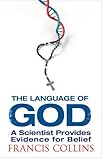
Francis Collins is head of the Human Genome Project, a highly respected scientist who is an expert in the study of DNA – the “instructions for building a human being”. In this book, he seeks to set forth in layman’s terms why he, as a scientist, believes in God.
He starts off by telling the story of how he came to be a believer in God, from an atheistic background. He was strongly influenced by the arguments of C. S. Lewis, but also was profoundly impacted by seeing the faith of the dying in his work in a hospital.
He devotes a chapter to providing brief answers to some of the common atheistic objections to faith. Isn’t belief in God just wishful thinking? What about the harm done in the name of religion? How can a good God allow suffering? How can a scientist believe in miracles. He doesn’t have the space to address each of these in depth, but gives a brief outline of how he would resolve these questions.
He then moves on to some scientific material, starting with the origins of the universe. The big bang cries out for a divine explanation, since the universe seems fine-tuned for life, despite this being wildly improbable. In a chapter on the origins of life on earth, he is critical of “intelligent design”, seeing this as a form of the “God of the gaps” argument.
Next is his speciality subject, the human genome. This is a fascinating chapter, and a good introduction to DNA if like me you know very little about it. As part of this chapter, he explains why he sees the DNA similarities between humans and other animals as compelling evidence for evolution.
Then follows a series of chapters dealing with different beliefs about the origins of the universe. He points out that the church once thought that the Bible taught that the sun revolved around the earth, but came to realise that the Bible in fact taught no such thing. He is of the opinion that a similar realisation is required with regards to the origin of the universe.
In a chapter on atheism and agnosticism, he accuses Dawkins of using straw man arguments, and insists that science, let alone evolution, cannot disprove God. His chapter on Young Earth Creationism dismisses it as incompatible with modern science. He remains civil but it is evident that he has very little time for this view. He also is unimpressed with the “Intelligent design” movement, arguing that many so called mechanisms of “irreducible complexity” may indeed be reducible.
He presents a fourth option, traditionally called “theistic evolution”, but which he prefers to term “biologos”. He sees the hand of God in the anthropic principle – the fine tuning of the universe for life, and in the ways that humans are unique that defy evolution (moral law plays an important part in his argument). He closes with a plea to all people to live as seekers of the truth, and not just stopping at those truths that science can determine.
A fascinating appendix deals with some of the ethical dilemmas raised by science, with a particular focus on DNA related issues such as cloning. As throughout the book, he is very humble in his arguments and seeks to strike a conciliatory tone as he presents opposing views.
What can I say about this book? He is of course going to upset many atheists on the one hand and many creationists on the other with his views. But both groups will at the very least find food for thought. It certainly is a good book for someone who is questioning various viewpoints and wants to hear a simple and respectful argument from a theistic evolutionary perspective.
From an evangelical perspective, what one makes of this book will depend largely on whether you are prepared to join him in reading Genesis 1 and 2 more as a “morality play” than as literal history. It seems to me that evangelicals are in the midst of a period of reconsidering their hermenuetics of Genesis in the light of scientific consensus, and there are a lot of options on the table.
The theistic evolutionary position has the strong benefit of being in complete agreement with the majority view, but from a theological perspective raises some very tricky problems. (not least at what point was there a being “in God’s image”, and whether there could be death and disease before “the fall”). These are questions that I don’t feel Collins tackles in sufficient depth to persuade most young or old earth creationists. Evangelicals will also perhaps question the way that Collins seems to have a somewhat ambiguous view towards the truth claims of other faiths, and can seem noncommittal on various aspects of bioethics (such as the point of the conception of life).
Overall I would recommend this as an interesting read from a scientific point of view (especially as an introduction to DNA), and also an introduction to the theistic evolutionary position (albeit without addressing the theology in sufficient depth). It may prove helpful to share with those who consider evolution to be a barrier to them exploring the Christian faith more seriously. It is a helpful contribution to an important debate, and one that has provoked me to read a little more on the subject, both from the same and competing viewpoints.

Pingback: Book Review – Should Christians Embrace Evolution? « wordandspirit